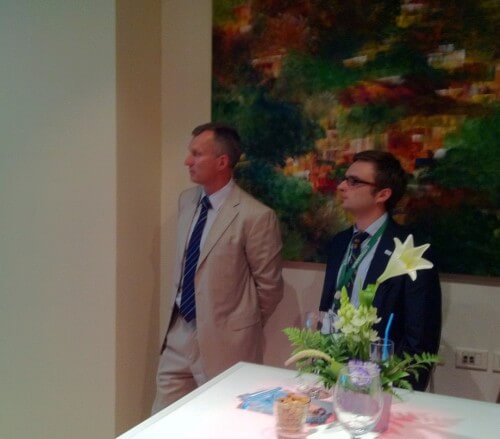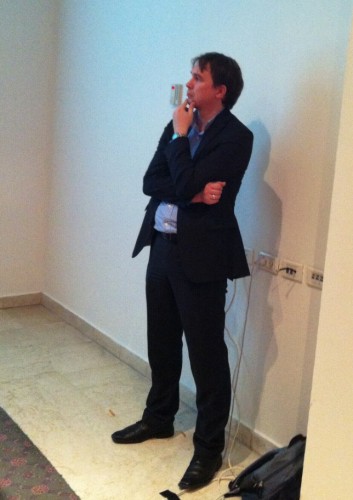The Ambassador of Lithuania in Israel and the heads of the conference, whose organization also includes an Israeli company, told about this as part of the Biomed 2012 conference that took place last week in Tel Aviv. It turns out that during the time of the USSR, Lithuania was the father of life sciences and an infrastructure for clinical trials was established there that has been maintained and developed ever since.

Nobel laureate Prof. Ada Yonat, as well as Prof. Michel Rebel, both from the Weizmann Institute and with them also Rina Pridor who founded and managed for many years the greenhouse project in the Office of the Chief Scientist will participate in the conference Life Science Baltics To be held in Vilnius, the capital of Lithuania, on September 12-14. This was announced at a special event that took place during the Biomed 2012 conference that took place in Tel Aviv last week.
Lithuanian Ambassador to Israel Darius Dagotis said that relations between Israel and Lithuania are currently in their best era ever. "I have been serving in Israel for three years. Three years ago there was one reciprocal visit per year by an Israeli or Lithuanian minister, now there is a visit every month. Last year trade between the countries increased by 50% and tourism by 62%. Israeli businessmen also discovered Lita, the country that is located in a very attractive place, and serves as the father to Northern Europe, whose development resembles that of Scandinavia, a country that emphasizes the training of young people in high-tech. In Lithuania, a fourth generation infrastructure was established that allows anyone to access the Internet for free from anywhere. Almost half of our young people have a higher education, half of the people speak at least two foreign languages (mostly English and Russian) and another 40% speak one additional language."

Paulus Lukaukas, organizer of the Life Science Baltics event, described the development of Lithuania since its (third) independence in 1990, its entry into the World Trade Organization, the European Union, NATO and even meets the Maastricht criteria for joining the Euro (not that this is a big deal today, he added). In the second half of 2013, Lithuania will lead the presidency of the European Union.
"The main thing we have in Lithuania is human talent, just like Israel. We have no natural resources. Our level of education is far above the European average, our location gives us access to the European Union market, we still have good connections and relations with the former USSR countries - a third of our exports, and they speak Russian, and we are also part of the Baltic Sea countries - and the Scandinavian countries are partners our trade.
The physical infrastructure - roads, trains and airports are very developed, and this gives us opportunities in the field of logistics. Lithuania also recorded the largest fiber optic penetration in Europe - 28% and the sixth in the world. The densest network of public Internet access points in Europe has the fastest Internet speed in Europe - in particular a download speed of 32.4 megabytes, and second in the world in upload speed - 24.4 megabytes, as well as the first in GSM penetration in Europe - 147%.
In the field of life sciences, we have 130 companies and 47 institutes in the field of life sciences - we were the father in the field of life sciences of the Soviet Union, and this is at least the only positive thing left from that period. The government invested 400 million euros in 5 research valleys - infrastructure and equipment to become one of the largest innovation centers in Europe
We are looking for foreign companies to use the infrastructure. and looking for partners in outsourcing, in infrastructure.
The success of the Lithuanian biotechnology industry is manifested in the employment of 18 thousand researchers in these fields - in a country of 3 million inhabitants. Lithuania is also an expert in the global laser field. In every scientific center in the world you can find devices made by Lita - 10% of the world market.
Lukaukas gives examples of some of the companies that are already utilizing the infrastructure and manpower in the field of life measures. One of them is Teva, which will also participate in the conference, having acquired a company in Lithuania - Sicor Biotech in 2007. The company has since tripled its activity in mop and production since then. Currently planning an investment of 22 million euros in a new factory. Thermo Fisher Scientific - an American company purchased a manufacturer of an enzyme called REAGEMNT and kits for research in cells and in its day for collar. MOOG - a medical equipment company - invested 4 million dollars in a local company.
In conclusion, Lukaukas says that the state also provides tax benefits, and manpower is tens of percent cheaper than other European countries despite its high level, and the state also offers benefits to those who choose to manufacture in Lithuania.
Representatives from the research institutions also participated in the event at the Biomed conference in Tel Aviv. Laima Matuileviciute, head of the development department at the Lithuanian University of Medical Sciences, says that the department has participated in several research programs funded by the European Union and is currently expanding its relationship with industry and looking for partners for technology transfer. "Our most successful project was Ha'am IBM Haifa, our researchers thought of the idea of pathological voice recognition, that is, identifying diseases from the patient's voice analysis. We developed the idea, IBM proposed the technological ideas, two groups of researchers work together and are now filing patents on it. We don't have enough transfer knowledge, but we use IBM's knowledge and they are already taking care of the patent registration."
We are located in Kovna in the largest research hospital in the Baltic region, which includes 35 clinics where clinical trials are held for companies from Russia, the USA and Israel. Our university, which teaches in the English language, also attracts foreign students and many of them stay in Lithuania.
Two Israeli companies participate in the organization of the event - Bioforum and Kaleidoscope. Shani Bullock, director of business development at the Bioforum company, who is responsible for the scientific program as well as for approaching Israeli and international parties as part of the business development of the conference, says that in addition to the lectures by Prof. Yonat and Prof. Rebel, there will be many business-oriented lectures as well as meetings and forums where they will discuss ways to increase The cooperation between the industry and government bodies. "The conference provides a fertile ground for B2B meetings and opens up possibilities for Israeli companies interested in cooperation and services with the Baltic countries.
The conference is financed with funds from the European Union and the Lithuanian government is also involved in the event. The Prime Minister of Lithuania will attend this event as well as other dignitaries from the Government of the Republic of Lithuania. Businessmen from all over the world as well as scientists are expected to attend the conference. Israel, which the Baltic countries see as a center for biomed, plans to send a distinguished delegation from both the business sector and the scientific sector."
